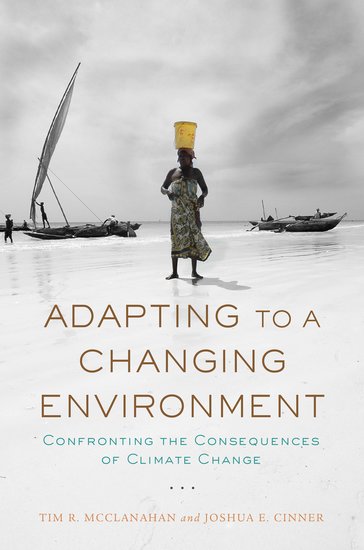By Tim McClanahan and Josh Cinner
Human relationships with nature can follow different paths. Sometimes the path leads to the collapse of both ecosystems and society. History shows that the directions down this path are simple; unsustainable practices lead to severe environmental damage. This damage has various harmful feedbacks into society, particularly through food production. For example, wild-caught species on coral reefs have an important impact on food production and are likely to be reduced through:
- Coral bleaching caused by ocean warming events that will affect reef fish targeted by fishers
- Rising water temperatures that will reduce fisheries resources in large lakes
- Changes in monsoon conditions and yields from rain-fed agriculture that could be reduced by up to 50% by 2020
- High intensity storms, such as cyclones, that are likely to increase in frequency, shift in distribution, and have localized but considerable impacts on food production

- The exposure to climate change
- The capacity of society to adapt to change or adaptive capacity
- Ecological conditions of key resources, such as fish and their habitats
Every social-ecological site, such as a fishing village, will have a variety of measurable variables that contextualize it among these three components. In the case of exposure to the climate, these might include the rate of temperature rise, the intensity of ultraviolet radiation, or current speeds. In the case of adaptive capacity, the variables might include the level of wealth, infrastructure, and education. While in the case of ecological conditions, the abundance of fish and corals may be most important.
The most relevant variables for each component can be combined into a single axis. Thus, we develop an axis of key ecological conditions, an axis of exposure to climate change, and an axis of adaptive capacity — each determined by local conditions. Together, the three components help to contextualize key aspects of the social-ecological site. Appropriate adaptation efforts will depend on the interaction of these three axes and a site’s position along these axes can provide important information about the types of policies and actions required.
Building adaptive capacity will require strengthening a society’s assets, flexibility, learning, and social organizations. The ways of doing this are diverse and will of course depend on existing local capacities and needs. Economic development plans most frequently focus on the short-term accumulation of assets, which can often come at the price of sustaining resources. Therefore other aspects have been emphasized for long-term solutions. Improving the condition of resources generally requires restricting or limiting society’s actions. In fisheries, these limits could be the time that people can fish, the gear they can use, and the sizes and species they can capture. These two broad concepts — building social capacities and limiting certain types of resource use — interact in complicated ways that create both challenges and opportunities for adaptation.
One of the central themes of social-ecological science has been that adaptation solutions are context dependent: not only aspects of local resource conditions, adaptive capacity, and exposure to climate change impacts, but also people’s history, culture, and aspirations. Decades of experience in international development have shown that local involvement doesn’t guarantee the success of development projects, but ignoring people’s ideas and capacities regularly leads to failure. On the other hand, although local involvement and context are critical, they are likely insufficient on their own for successful resource governance or climate change adaptation. Policies and programs at the local level must be supported on national and international scales. Where these larger scale linkages are missing, local actions can often be futile.
Tim McClanahan is a Senior Conservation Zoologist at the Wildlife Conservation Society. His science and conservation work focuses on tropical fisheries, climate change, ecology, and management of coral reefs. Joshua Cinner is Senior Research Fellow at the ARC Centre of Excellence for Coral Reef Studies at James Cook University. A human geographer, his research explores how poverty and other socioeconomic conditions influence how people use and govern natural resources. Tim McClanahan and Joshua Cinner are the authors of Adapting to a Changing Environment: Confronting the Consequences of Climate Change.
Subscribe to the OUPblog via email or RSS.
Subscribe to only environmental and life science articles on the OUPblog via email or RSS.
View more about this book on the ![]()
![]()



Recent Comments
There are currently no comments.